Shelina Zahra Janmohamed's Blog, page 17
March 23, 2011
How to be an (extra) ordinary revolutionary
Somewhat belatedly, here is my monthly EMEL column. Please note it was written at the end of February, so events have definitely moved on since then…
One ordinary individual can be the catalyst for change.
On December 17th 2010, a 26-year old Tunisian fruit seller set himself on fire in front of a government building. The graduate, who could not find a job, was trying to earn a living with his stall. On that fateful day, he was halted by a police officer who seized his goods, claiming that the man was working without the necessary legal permit. It is not clear what happened next: did the police officer slap him, or did he go into a centre for unemployed graduates to complain of his treatment only to be faced with laughter and insults? We will never be sure. But this much we do know: what the young man did next has sparked a regional revolution.

courtesy of paul-wakefield.co.uk
Eighteen days later, on January 4th, he died of severe burns. Ironically, he was even visited in hospital by the man he was protesting against, President Zine El-Abidine Ben Ali, and a photo was released of the meeting by the presidency. The death of the young man, Muhammad Al Bouazizi, was seen as a symbol for all the young college graduates who were unemployed; a catalyst for the demonstrations that led to the fall of the President and his departure from the country.
Having seen what was possible in Tunisia, Egyptians gathered the courage to follow suit. An unknown young woman's [Asma Mahfouz] YouTube video encouraging people to protest in Tahrir Square was one of the triggers for unrest in Egypt, and as I write this, the will of Egyptian people has led Mubarak stepping down. They were ordinary people, engaging in acts that a few months ago would have been extraordinary. Courage filled their bellies. The King of Jordan has also seen the writing on the wall and dismissed his cabinet, realising that if he does not pre-empt change, then he himself will be its casualty.
History has many names filling its books, of men and women who through their actions have brought revolution and improvements. These include familiar popular heroes like Malcolm X, Martin Luther King, Nelson Mandela. Individuals like these are held up as inspirations of what one person can achieve. However, it is those whose names may well be forgotten, but whose actions and their consequences will live on – like Bouazizi, like the video protagonist – which I find particularly motivational. These are 'ordinary' people, like you and me, with no label, pedestal or distinction. The risk with 'great names' is that we put them on a pedestal, and believe that we are unable to effect the change of these great personalities. The weight of history can intimidate us, feeling that we are not 'great' in our selves, that we are unworthy of making our mark on the human course of events. But this is simply not true. Al Bouazizi and countless others show us that one single individual can be a catalyst for change. I am not advocating that we go round setting ourselves on fire – self-harm is contrary to Islamic philosophy. However, a single action can have potent repercussions. Even a word said can resonate over time and place to create change. There is no more popular and oft-repeated phrase today than Martin Luther King's "I have a dream." These four words continue to evoke a passion for change.
Prophet Muhammad's birthday in February also reminds us what an enormous impact one individual can make. None of them set out to be great, they all simply set out to do the right thing to the best of their capacity. It was the cumulative effect of each action going towards a better world that has set them up as individuals to inspire us, and it is the choice to make each action the right action – and for each action to count – that is important. One of my favourite children's stories from Islamic history is that of Prophet Ibrahim when thrown onto the fire by King Nimrod for denying Nimrod's divinity. The little ants scurry around trying to put out the fire. As a child, I recall how a conversation between one of the angels that descends and one of the ants that is busy ferrying drops of water from a nearby puddle onto the enormous inferno is played out. "Why are you bothering?" asks the angel. The ant replies very simply, "Because at least I know that I have done my part."
March 19, 2011
Is the luscious eyebrow the gateway to being a real woman?
My weekly column in The National was published today.
It was the time for me to become a woman once again. A short but excruciating amount of pain would leave me radiant and glowing, assured of my truly feminine status. I was at the beauty salon to "have my eyebrows done".
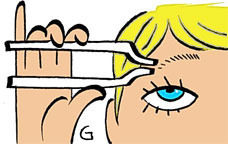 Why oh why do I do this to myself? It's a strange form of addiction, exchanging pain to get the temporary high of "beauty". The gorgeous arc of the eyebrow "opens up my eyes" and makes them sparkle, apparently. But eyebrow-shaping is also one of the worst forms of self-inflicted persecution I know.
Why oh why do I do this to myself? It's a strange form of addiction, exchanging pain to get the temporary high of "beauty". The gorgeous arc of the eyebrow "opens up my eyes" and makes them sparkle, apparently. But eyebrow-shaping is also one of the worst forms of self-inflicted persecution I know.
The beautician (for which read "torturer") summons me into her small room and beckons me to lie down on the narrow treatment bed. She tuts at the horror of my bushy brow overgrowth. To me, they still look presentable, but she informs me that they are unsuitable for public display.
She leans over my face, her ample bosom precariously close to my face, the smell of her perfumed uniform is at once comforting but also a signal of the pain I am about to endure. And yet here I am, month in month out.
I've bought into the notion, which the beauty industry has sold to me, that without pain there is no gain. But this industry is not only those nasty faceless conglomerates that churn out various white creams that will moisturise, nourish, cleanse, rejuvenate or anti-age me. It also includes well-meaning friends, mothers, bossy aunties and colleagues who advise on what it means to be womanly. And having perfectly shaped eyebrows is part of womanliness. It is you know, it really is.
"Can you hold here?" she dictates, drawing me in to participate in my own torment. I close my eyes, and use one of my hands to depress and gently pull down my eyelid while using my other hand to winch up the skin above the brow. With the eyebrow held taut she begins work to excavate my long-lost luscious brow. She has wound a piece of white cotton thread (it's always white, I don't know why) between her hands and her mouth. Holding it tight she pulls away lines of hair from above, below and between my brows. A thousand hairs are yanked without any ceremony from right above my eye, and tears start streaming down while I suppress a scream. Real women don't scream when they are becoming woman-ified.
Sometimes, I wonder if men notice. Are you tuned in to the trouble that most of the women around you go to? The comedian George Carlin says: "Ladies, here's how much men care about your eyebrows: Do you have two of them? Good, we're done."
I'm not going to go through this trauma without due recognition, however. I've trained my husband to notice when my eyes have gained their freedom from eyebrow overgrowth. If the compliment is not spontaneous, I stand directly in front of him in obvious anticipation.
But is it the male species that we do it for? I don't think so. The shaped eyebrow confirms our eligibility into the "real woman" club, a small but effective signal that says: "I am a woman who cares about myself."
If a woman doesn't care about how she looks, then what kind of woman is she? I'd like to say I'm the kind of woman who hasn't bought into the social pressure to conform to being what is considered a socially acceptable "real woman".
But I have.
And after each torture session, I can't help but admire my luscious curved brows and newly liberated sparkling eyes.
March 17, 2011
OgilvyNoor survey on Muslims, your chance to take part
 Remember the guys who I wrote about last year at OgilvyNoor?
Remember the guys who I wrote about last year at OgilvyNoor?
In case you missed this piece and this one too, I wrote about Ogilvy & Mather, one of the world's largest marketing and advertising agencies, which commissioned research to better understand the world's 1.8 billion Muslim consumers. They came up with some interesting segmentation based on their research across various Muslim countries and launched the "world's first bespoke Islamic branding consultancy" called OgilvyNoor. Here's a quick recap:
The 'Connected' (27%) who see themselves as part of the web-like network of the Ummah, saying 'religion connects me'. Technology is positive, and compassion ranks highly. The 'Grounded' (23%) say 'religion centres me': Islam is their anchor, religion and culture are inseparable. They seek peace and closeness to God. The 'Immaculates' (11%) say 'religion purifies me' are younger, seek discipline and perfection, and may incline towards rejecting the impure. These three segments have a more 'Traditionalist' mindset; a desire for harmony and belonging; quietly proud of their faith; aligning with values of tolerance and compassion.
The remaining three segments were noted as of key importance in influence, labelled as the 'Futurist' mindset who see themselves as steadfast followers of Islam in a modern world. They are individualists who 'choose' Islam. Their pride is intense, regardless of the extent to which they would be categorised as 'devout'. They believe in education and question intention. 'Identifiers' (27%) wear Islam with pride: 'religion identifies me' and want it strengthened and defended. The 'Movers' (6%) say 'religion enables me'. They are internet savvy and act as change agents. The 'Synthesizers' (6%) are pragmatic, and adapt religious practice to their needs saying 'religion individuates me'.
Well, they've put out a survey which you can participate in. It's open to anyone who is Muslim, and only takes a couple of minutes.
As a marketeer myself, I'm always curious about such surveys into the Muslim population. I've just done the survey myself, and it asks some questions which prompt a little thinking about what it means to be Muslim, what kind of values are important, what kind of leadership Muslims aspire to and so on. Interesting coffee table conversations will probably be sparked, and I'm curious to see the findings.
Here is the link if you want to give it a go yourself, although they state that it's open only to Muslims: http://www.surveymonkey.com/s/TN78GKL
March 12, 2011
Foreign ministers and their slip ups – funny or frightening?
My weekly column in The National was published today.
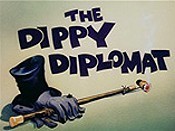 If you've ever felt nervous before delivering a speech to a high-powered audience, then spare a thought for India's foreign minister. He stood up to address the Security Council at the United Nations, but instead of giving his own speech, he read out the notes of the Portuguese minister. An Indian official had to stop him as he read out statements of pleasure at seeing other Portuguese speaking officials in the audience. Oh dear.
If you've ever felt nervous before delivering a speech to a high-powered audience, then spare a thought for India's foreign minister. He stood up to address the Security Council at the United Nations, but instead of giving his own speech, he read out the notes of the Portuguese minister. An Indian official had to stop him as he read out statements of pleasure at seeing other Portuguese speaking officials in the audience. Oh dear.
Ordinary folks like me might be forgiven for thinking that the role of foreign minister is only ever occupied by those of the highest professional standards, and who have somehow been immunised from embarrassing gaffes. Not so. Reading out the wrong speech might have left the individual a little red-faced and provoked giggles from the audience. But it's not uncommon for slip-ups to have more serious repercussions.
Jack Straw, during his tenure as foreign secretary of the UK, was infamously photographed shaking hands with Robert Mugabe. He claimed that although he had previously worn glasses, he had just started wearing contact lenses, and through his blurry vision had failed to identify the Zimbabwean president in time.
Of course ministers can and will get in a pickle and do embarrassing things. The trick is to ensure you have a credible excuse that explains it away without compounding the shame.

courtesy of the-spine.com
This week, the UK's foreign secretary, William Hague, has failed to do exactly that. There must have been a lot of burning cheeks and nervous laughter at the failure of the James Bond-style SAS mission that was authorised to go into Libya. Eight operatives, at least six of them from the SAS, were dropped by helicopter near Benghazi at 3am, and suspicious local rebels took them prisoner. The irony is that the rebels suggested that there was no need for subterfuge, and the British would have been allowed entry to the east of Libya – all they had to do was ask.
So what is Mr Hague's excuse for the macho mission? Er, it wasn't my fault; it was the military. If you're going to pick someone to blame, Billy-boy, I wouldn't pick the guys with the tanks.
You might find these incidents to be the funny side of diplomacy. But poor judgement in the international arena can have serious consequences.
France's foreign minister offered Tunisia help in restoring order shortly before the fall of the Ben Ali regime. In simple terms, France was advising on how to put down the protests. Definitely on the wrong side of history.
As the Quartet's envoy to the Middle East, Tony Blair is a foreign minister of sorts. His words with regard to Hosni Mubarak of Egypt were so ludicrous that one might be forgiven for thinking he himself was having a go at satire. In February, as the Egyptian protests began to gather momentum, Mr Blair said with a straight face that the Egyptian president was "immensely courageous and a force for good". If the consequence of his words wasn't so deadly serious, it would have been funny.
Foreign ministers hold a high degree of responsibility for peace between nations. Their errors are funny exactly because of the contrast between the stupidity of some of their actions and the high pressure stakes under which they operate. When their actions remain on the side of humour instead of crossing the line into horror, then we feel safe to chuckle, as we have at the French and the British in the past few weeks. But if things had gone wrong in Tunisia or Egypt, I don't think any of us would have been laughing then.
March 9, 2011
Women stuck between the darkness of Jahiliyyah and a brighter dawn
I came across two stories yesterday about women in the Arab world that could not have been more different.
The first was a press release I was sent from the "Network of Free Ulema" in Libya. I don't know anything about them (other than the fact that the press release was in English, which I thought was quite curious. I'm assuming there was an Arabic version too. And the info that they've carefully written up in Wikipedia. They are very media savvy. Good for them!)
The press release was on the occasion of International Women's Day in order to:
"celebrate your heroic political, social, scholarly and economic achievements. We congratulate you, and promise you that all of us, women and men, will work together towards a Libya of equality and fairness for all."
I haven't copied out the whole text, but I did like this line at the end:
"May the significance of this special day, become an inspiration for a New and Free Libya."
Women's actions can and should be an inspiration not just for women, but for everyone. I like the recognition of this.
It's great to see this worldliness in the Ulema, and their recognition of the importance of women and the status and respect that they deserve. It gives me some hope for change. It also underlines a point I made in an article earlier this week that the up-front participation by women in the revolutions of the Middle East has forever changed their status. It's re-iterated in a piece written by Naomi Wolf on The Middle East Feminist Revolution.
Contrast this with a heartbreaking piece in The National yesterday about the prevalence of women in Saudi Arabia who are being forced NOT to marry by their fathers and brothers. The article writes:
Amal Saleh would like to marry and have a family, but she needs her father's permission. And he won't give it. A university professor in her mid-thirties, Amal has had numerous suitors asking for her hand, but her father always refuses. "They are not rich, or he doesn't like their fathers or they are not from the same social group," she says. Work colleagues who proposed were turned away because they were not from the same tribe. Her brothers support her father, she says, because they fear "that if I had a partner he would share in my money". For her male relatives, Amal says, "I am like a horse. They don't treat me as a human being. They treat me as if I belong to them and they should decide what to do with this 'thing'." The National is not publishing Amal's real name because her father threatened to kill her if she sought help outside the family.
It seems that a number of reasons lie behind fathers and brothers witholding permission to marry – permission which is required under Saudi Arabia's guardianship laws for women to marry. The woman's salary is lost to the family. They are worried that she will take away her share of the inheritance. They don't like the family of the intended.
Even though such behaviour on the part of the family is against Islamic law – and the country's chief mufti has stated it to be so, adding that it should bring a penalty of imprisonment, this tribal custom persists. In fact,women who protest against such behaviour are taken to court by their families for 'disobedience', and bafflingly the court upholds this.
Amal's words wrench my guts. She uses a similar analogy to the period of jahiliyyah that I've used before. She says:
"Before Islam, they had this practice of killing a girl when she is just a baby [because] they were ashamed of her as they wanted a boy," Amal had said in the interview. "Now I'm saying that history is being repeated. They kill us when we have emotions and can understand and are aware of our rights. Maybe if they killed me as a child it would be better than now."
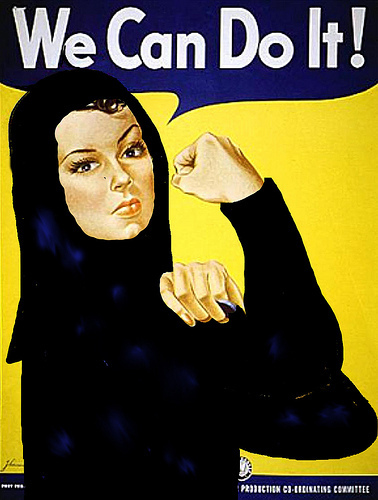
courtesy of susiesbigadventure.blogspot.com
Two corners of the Muslim world, two very different stories. On the one hand there is hope that respect for women and a recognition of their equality and status is now on the horizon. On the other hand, despair that there is still a long way to go.
March 8, 2011
Which Muslim women inspire you? (In celebration of International women's Day)
Today, March 8th, marks the 100th anniversary of International women's day.
According to wikipedia, : "It is a major day of global celebration of women. In different regions the focus of the celebrations ranges from general celebration of respect, appreciation and love towards women to a celebration for women's economic, political and social achievements." It's a day to celebrate women – whether you are a woman yourself, or simply proud of the women in your life.
Around the blogosphere, facebook and twitter I've seen comments by men asking "What about a Men's day?" or "International bloke's day". You forget, gentle male-people, that celebrating women and their achievements is also a celebration of humanity, and by extension of men also. You forget, gentle male-people, that for thousands of years women were taken for granted, oppressed and brutalised (still are all round the world, but slowly slowly, gradually this diminishes.) What is a just one century of celebrating one day by comparison?
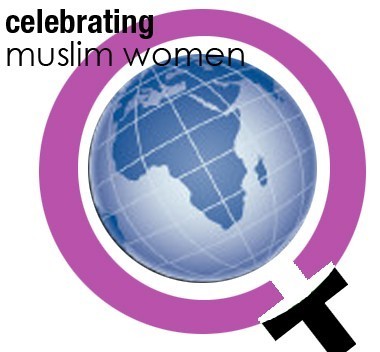 Anyway, on this day, I am asking a specific question in relation to Muslim women who have inspired you or captured your imagination…
Anyway, on this day, I am asking a specific question in relation to Muslim women who have inspired you or captured your imagination…
Which Muslim women, contemporary or historic, based out of Europe and the Levant, do you find inspiring or captivating, and why?
March 4, 2011
The time for women's voices to be heard has come
This is my weekly column, "Her Say" published today in The National (UAE).
The old clichés that the women of the Middle East are backward, uneducated and complicit in their oppression have been wrenched away from the global discourse. It was a narrative that sought to take away your voices by claiming to know better than you what you want.

Egyptian women shout slogans in Cairo's Tahrir Square. Photographer: Pedro Ugarte/AFP/Getty Images
But you have changed all of that. Around the world, we've seen your presence across television screens, in newspaper pictures and throughout the internet. We've heard your voices on the radio, in interviews and speaking to friends, colleagues and global citizens. We've felt the strength of your emotions and beliefs translate into political change – which was unforeseeable three months ago – change that has occurred thanks in great measure to your participation. We have seen you side by side with men demanding justice and freedom. Irrespective of religion, ethnicity, geography and education, you have had your say. And your say has made a difference.
On January 18, a 26-year-old woman in Egypt, Asmaa Mahfouz, uploaded a video on YouTube, urging her fellow citizens to go out to Tahrir Square, to fight for their country. The video went viral and it is suggested that her say was one of the catalysts that sparked the revolution. She is just one example among many of how a woman's voice can be clear, true and unafraid; how a woman can and must make a change; how a woman must be listened to and respected. In this case, Mahfouz had her say, which helped to inspire a nation.
We should pause at this moment in history to recognise the voices of such women at the front line of carrying the aspirations of their people into visible change. Even more important is that society has come to realise that women have voices, that they have something important to say. And more critically, they must be listened to.
Those in power – whether at the level of high political office, or simply at home – have realised that a woman's say is fundamental to a healthy and dynamic social fabric. If women's voices – "her say" – were not recognised, valued and listened to before, the time is now for them to be acknowledged for the importance and value that they hold.
This column has the most appropriate title for a piece of my writing at this moment. And it is even more poignant because March 8 will mark the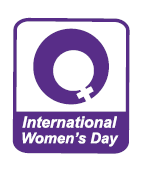 centenary of International Women's Day. Who can say if a century ago I could have written to express my views so freely?
centenary of International Women's Day. Who can say if a century ago I could have written to express my views so freely?
"Her say" might have been considered inappropriate, might still be considered as such in some quarters, but the seeds of change are flowering today.
There are those who claim that women should restrict themselves to the private domain. But recent events have proven otherwise. It is only when men and women have come out together, when men and women have raised their voices together, when her say as well as his are articulated, that change can happen.
The importance of her say in public and political events is clear, but this applies equally to the private domain. Whether you are a man or a woman, take a moment this week to turn to the women in your lives and ask them: "What do you want to say?" Then make sure to listen clearly to her aspirations.
The answers might surprise you.
March 1, 2011
Dictatorship: a career for men only? (I'm not aspiring for gender equality in this profession)
My regular "Her Say" column was published over the weekend in The National (UAE), inspired by the events across the Middle East.
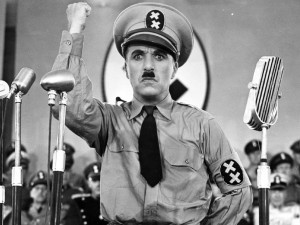
Charlie Chaplin in The Great Dictator
Colonel Muammar Qaddafi, Hosni Mubarak and Zine el Abidine Ben Ali – they've all been dominating the headlines over the past few weeks. They've a lot in common. They've presided over their countries with all sorts of clichés: ruling with an "iron fist", failing to see the "writing on the wall" for their regimes and not listening to the "voice of the people".
They also have one specific genetic factor in common: this career is for men only.
Although I support gender equality in all walks of life, this is one area where I wouldn't be in a hurry to see women taking a more equal role. Female dictators are a rare breed. And I'm quite happy for feminism and dictatorship to continue being unlikely bedfellows, thank you very much.
There are a few that have come close. Indira Gandhi ruled under emergency law, claiming it after widespread communal riots in India and effectively having quasi-dictatorial powers for a few years. Jiang Qing exercised a great deal of power in China as the health of her husband, Mao Zedong, declined, so much so that she was tried along with the Gang of Four. Romania's Elena Ceaucescu was executed along with her dictator husband for her contribution to his house of horrors. And Imelda Marcos? Now a member of Congress, she is remembered more for her excesses in taste while husband Ferdinand ruled the Philippines.
By and large, the women practised a twisted form of marital companionship, supporting and goading on a husband in his ruthlessness.
There are some obvious reasons for so few female dictators. Dictators often achieve power by working their way through the military and then staging a coup. Until recently, women were almost absent from the armed forces. And, in countries where dictatorial power flourishes, all people generally – but women in particular – have precious little themselves.
Some people say women are inherently selfless and just don't want to oppress others. It's the "women are nicer human beings" argument. Others reckon we have better things to do. Personally, I like to spend time with family, enjoy good food and, if I have some time left, maybe squeeze in a manicure or facial.
I just don't have the time and effort to brutally suppress, torture and massacre people consistently over time with the kind of obsessive focus and dedication you need to achieve dictator status. I mean, if you're going to do it, you don't want to be the dictator that time forgot. You want to go down in history as a cat-stroking, out-of-his-mind madman and badman.
The last week has seen plenty of madness, badness, horror and tragedy. The brutal consequences of dictatorship are not to be mocked or satirised. They are not part of the war on sexism or the humour that makes us laugh at the gender gap.
Instead, in the countries where courage has filled the bellies of its people, both men and women have taken what power they do have to ensure they have a hand in bringing the dictatorship to an end.
But it is the participation of the women that has been incredible over the past few weeks and has made me feel so proud. Heads held high, fists in the air, they have played an active part in bringing down those who have oppressed them.
Dictators beware: however you got to power, whatever your gender, your time is over. Step aside.
February 28, 2011
The love story begins at the wedding
This just posted at the Guardian's Comment is Free site, in response to the question: "What is marriage for?"
Marriage is a formal written commitment to each other that benefits the couple, the children and society.
The idea that the reason to get married is to express your love for each other – or worse still to have a good knees-up with your friends – is a modern nonsense. Love is an important part of marriage for sure, but it is not a mandatory prerequisite. After all, real-life marriage is not a Hollywood movie, nor a Cinderella-esque fairytale where the love story ends at the wedding. We've got it backwards: the love story begins at the wedding and ought to grow. And it's here that we seem to have got mixed up as a modern society. The wedding is not the marriage. The wedding is a gateway to marriage, a formalised written commitment.
Contractual agreements in personal relations are underrated these days. You wouldn't buy a house or start a job without a contract, but we have romantic notions that a verbal declaration of love is sufficient to entrust our life, heart, emotional and spiritual wellbeing in another person.
Formal, written, structured agreements do have an impact on individuals.Harriet Baber says security is the main reason for marriage, but her argument is a negative one, giving security against what she sees as the minus points of singledom. But I'm arguing that commitment and contracts encourage a more positive state for the couple – otherwise why put in the effort? There is clarity of expectation and direction. There is a clear understanding of joining together in union. There's the positive mental attitude that says you're in it for the long haul – and positive thinking is mighty powerful. Marriage in this sense is for the private good.
Having structured units with parameters and responsibilities that society recognises is also for the public good – offering stability, respect and boundaries for that relationship. And marriage seems to be a good thing for children, too. Yet we have no training these days in how to initiate and manage relationships (sex yes, relationships no). It's all Hollywood and Heat magazine.
Arguments about what marriage is for tend to focus on only one of the three components – the couple, society or children, but the fact is that it's a little bit of all three. Marriage is a formal written commitment between two people, with clearly spelt out rights and responsibilities on both sides. (That's the problem with the "expression of love" or "knees up" approach to weddings – instead of focusing on the relationship, it's all about the party.) These rights and responsibilities are recognised by wider society and enforced either legally or socially. In our culture, one example of these things is usually fidelity. This is usually a clear expectation of both spouses, and wider society is expected to support this. Hence we have the greater (but sadly diminishing) social stigma of having a relationship with someone who is married. Happy, well supported and stable couples mean happier and more stable societies. It's mutually beneficial.
This is Cif belief, so I guess we ought to mention religion. Marriage has a central place in religion, and Islam is no exception. So, to cover off the religious aspect, here is what Islam says: that marriage is a divine sign in order that the spouses may find peace and contentment in each other, and that love and mercy has been placed between them. In its essence, marriage is for the benefit of the two people involved, creating a tranquil and loving union. But it's more than that too: to get married is to complete "half your faith", it is part of fulfilling the human mandate and achieving spiritual perfection. And only then do we get to procreation as the reason for marriage. Islam is big on clear, solid family structure, and children knowing and respecting who their parents are. And it's also very firm on parents taking clear responsibility for the upbringing and long-term care of their children.
A few months ago I was rummaging through the fabulous second-hand bookshop Barter Books in Northumberland, when my eye was caught (as it is want to do, since I am a writer with a fascination for love and marriage) by a dusty tome entitled Wooings and Weddings in Many Climes. Mainly, I love the word "wooing" and wish we would use it more often. I also wish that as a society there was more wooing going on. First published in 1900, the author travelled through various cultures and brings us stories and pictures of how different peoples engage in marriage. (Particularly good is the one on "Wigwamland".) The one constant she is at pains to point out is that marriage flourishes in all contexts. This abundance of marriage across time and geography is something that should give weight to this question of what marriage is for and its potential benefits.
More than a hundred years ago, she made an observation that would not be out of place today: "I have found the marriage customs of most peoples strangely alike. And I have found the marriage fact, wedlock itself, almost identical everywhere. [...] The highest of all arts is the art of living with others – above all the art of living with those nearest and dearest. How many of our children are ever taught its alphabet?"
February 24, 2011
If you are a Muslim, what is the strangest thing you have been asked…
"Why do you shove it down our throats?" yelled the man from the audience.
I was speaking at the LSE Literary Festival over the weekend on a panel about "Islamophobia and Literature". It was a Saturday night, and thus the full audience made for an impressive turn out on a fairly heavyweight subject. We the panellists were a light-hearted bunch though – my book on love, and the others had re-written fairy tales, and a book about a Muslim women's chat group amongst their other credentials.
Anyway, back to the heckler.
"Shove what down whose throats?" I yelled back to him.
"You lot, you Muslims. Why do you try to shove it down our throats?"
It was the usual Daily Mail diatribe ("We're becoming a shariah state, the Moozlims have taken over! We've been eliminated from our own country" etc etc.) so I decided to challenge him back for hard evidence, not just rhetoric. "Give me three examples of when someone has shoved it down YOUR throat?" I heckled back.
He muttered, the wind taken out of his sails, something about 'Tower Hamlets' and then grumbled under his breath as though he'd had enough.
If he had had enough of Muslims and Islam, why on earth had he come on a Saturday night to a literary discussion about Islamophobia, I wondered. A nutty form of masochism? A secret penchant for Muslims?
 It got me thinking… If you are a Muslim, what is the strangest, funniest or most curious thing that you've been asked? What could you barely contain your giggles about, but had to answer seriously? Or what did you think 'How on earth am I supposed to know the answer to that?'
It got me thinking… If you are a Muslim, what is the strangest, funniest or most curious thing that you've been asked? What could you barely contain your giggles about, but had to answer seriously? Or what did you think 'How on earth am I supposed to know the answer to that?'
Shelina Zahra Janmohamed's Blog
- Shelina Zahra Janmohamed's profile
- 175 followers



